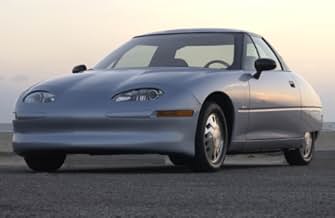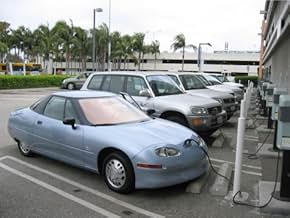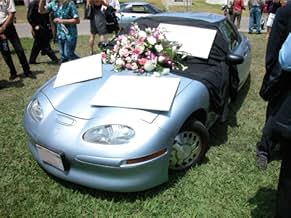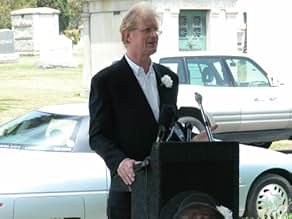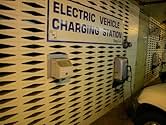Qui a tué la voiture électrique?
Titre original : Who Killed the Electric Car?
- 2006
- Tous publics
- 1h 32min
NOTE IMDb
7,6/10
13 k
MA NOTE
Ajouter une intrigue dans votre langueA documentary that investigates the birth and death of the electric car, as well as the role of renewable energy and sustainable living in the future.A documentary that investigates the birth and death of the electric car, as well as the role of renewable energy and sustainable living in the future.A documentary that investigates the birth and death of the electric car, as well as the role of renewable energy and sustainable living in the future.
- Réalisation
- Scénario
- Casting principal
- Récompenses
- 4 nominations au total
Martin Sheen
- Narrator
- (voix)
Reverend Gadget
- Self
- (as Greg 'Gadget' Abbott)
David Freeman
- Self
- (as S. David Freeman)
Frank Gaffney
- Self
- (as Frank J. Gaffney Jr.)
Avis à la une
I'm neither a liberal or a conservative (yes, there are other options!)and while I expected to read the usual 'party lines' concerning the politics of this movie ... I was AMAZED at how many people missed the point of the movie. This wasn't, at its heart, a movie about the politics of energy. Rather, it was a human story about people who found, and even fell in love, with a preferred form of transportation, only to have it taken away from them against their will. ***CAUTION --- POSSIBLE SPOILERS AHEAD*** I don't think what I'm about to say will spoil the movie experience, but I decided to play it safe. The most amazing part of the story, to me, concerns the quiet battle between General Motors and the EV1 lessees who wanted desperately to keep their vehicles. Why did GM take such a hard core approach? It seemed to me a more conciliatory approach would have done the embattled auto-maker a world of good. To me, that was the question that drove the story. Yes, most of the people who apparently leased one of GM's electric cars were celebrities and/or people of some measure of wealth. So what? Anyone who likes electronic gadgetry has heard the expression "early adopter," referring to those with money who purchase state-of-the-art equipment at high prices, thereby fueling the development and investment that pushes products to consumer-level pricing. GM's inability to realize this is what makes the whole story fascinating. I encourage anyone who would, to watch the movie closely, and see If this doesn't ring true. Now, having said my piece about the movie, let me throw some comments about energy policy into the fray. 1) We absolutely, positively need gas to reach a price of $5 a gallon or more. Why? Supply and demand. Only when it HURTS to drive a gas guzzler, will most of us finally get off that doomed bandwagon. 2) We had a solution to coal produced electricity in our laps twenty years ago, and a piece of Hollywood drivel ("The China Syndrome")turned us into weenies. Yes, folks, I mean nuclear power. It CAN and IS producing power safely, and environmentally soundly. Just not here in the U.S., by and large. Finally, 3) Supporting the development of electric-only cars is a viable choice. With the improvements being made in solar panel technology, I suspect a working battery-solar hybrid may be a very real option in the NEAR future. If we avoid the stupidity this movie helps us to understand.
This movie really highlights problems with American business. It seems that even after killing the electric car, there is actually a concerted effort afoot to kill the electric car movie. I can see that someone might not give it a 10 but a 2? Come on, its a great movie. Someone appears to be lowballing the vote. How anyone can build a love story and turn it into a tragedy -- about a car is amazing but unfortunately believable. I don't believe in conspiracy theories but I guess here it is just a strongly for or strongly against issue so it really isn't a conspiracy. However, I see the misinformation brigade that the movie caught in its own lies is at it even here at IMDb. Can you imagine a car company recalling all its cars, crushing them and killing the entire line just because a safety standard changed? Come on, whoever wrote that, please tell us what wavers were made? That explanation just doesn't make sense. A little more engineering and any problems (if there are any) can be solved. I highly recommend that anyone who drives, breathes, or hates to buy gas should see this movie.
I don't have many documentaries to my credit as far as how many I've watched, but I thought this was great. Part of its appeal was its bringing to light an issue that was either completely unknown to most Americans, or otherwise forgotten. If you consider the parameters surrounding the short lived electric car, then it is easy to see how many of us wouldn't even have known there was a killer of the electric car. Consider that there were few made by GM, Ford, and Honda. Consider that they were only released in California and Arizona. Consider that in those markets not many were sold. And finally, consider that none of the car companies spent much money or effort into advertising these vehicles, then you can see how so many of us were largely ignorant of the plight of the electric car.
This documentary was very informative and fact driven which I appreciate. Sure, politics played some role in it all, but when doesn't politics play a role in major issues? This documentary really be-smudged GM, but since I'm not a GM enthusiast, it didn't bother me one bit. I'd even go so far as to say that this documentary was the only thing that actually made me feel guilty about owning a Hummer. SUV's are my only environmental vice. I recycle, I don't litter, I try to stay away from aerosols, and I generally do what I can... except when it comes to SUV's.
It was interesting to see the active annihilation of the electric car. One can only wonder what the advances in electric vehicles would be if they were to have remain in production. Everyone knows how resourceful and inventive humans can be. Given the right incentive (money), there would probably have been about a dozen upgrades to the electric car and the infrastructure from '96 til now. And to think my home state of California had the chance to be the thorn in the side of the auto industry to effect change but then blinked, only goes to show just how mighty the oil and auto industries are. But I still believe that the electric car will make a second coming. Because if the environment is not enough of an incentive for people to make a change, gas prices certainly will be.
This documentary was very informative and fact driven which I appreciate. Sure, politics played some role in it all, but when doesn't politics play a role in major issues? This documentary really be-smudged GM, but since I'm not a GM enthusiast, it didn't bother me one bit. I'd even go so far as to say that this documentary was the only thing that actually made me feel guilty about owning a Hummer. SUV's are my only environmental vice. I recycle, I don't litter, I try to stay away from aerosols, and I generally do what I can... except when it comes to SUV's.
It was interesting to see the active annihilation of the electric car. One can only wonder what the advances in electric vehicles would be if they were to have remain in production. Everyone knows how resourceful and inventive humans can be. Given the right incentive (money), there would probably have been about a dozen upgrades to the electric car and the infrastructure from '96 til now. And to think my home state of California had the chance to be the thorn in the side of the auto industry to effect change but then blinked, only goes to show just how mighty the oil and auto industries are. But I still believe that the electric car will make a second coming. Because if the environment is not enough of an incentive for people to make a change, gas prices certainly will be.
A look into the anticipated introduction of electric cars in the mid '90s to their mysterious recall a few years later. The documentary talks to former electric car owners, government personnel and others while examining the automobile industry and the laws that around it. All trying to draw a conclusion about why this clean, efficient, sleek yet affordable vehicle was pushed from the market in the midst of global warming and rising gasoline prices.
The film presents an interesting and largely hidden topic. Giving a brief history of the electric car, which interestingly used to be more popular than gasoline based cars (!!!!), it will leave most viewers scratching their head and wanting to know more. The resulting investigation is surprisingly large in scope and encompasses many things from the highest echelons of government right down to average Joe. All in a brisk 91 minutes.
However, the film is not just interesting, it addresses many concerns that have been rising faster and faster for a while now, which makes it also an important documentary. --- 9/10
Rated PG: "brief mild language." That's funny, Jaws, with all of it's terror, gore and death is rated PG too.
The film presents an interesting and largely hidden topic. Giving a brief history of the electric car, which interestingly used to be more popular than gasoline based cars (!!!!), it will leave most viewers scratching their head and wanting to know more. The resulting investigation is surprisingly large in scope and encompasses many things from the highest echelons of government right down to average Joe. All in a brisk 91 minutes.
However, the film is not just interesting, it addresses many concerns that have been rising faster and faster for a while now, which makes it also an important documentary. --- 9/10
Rated PG: "brief mild language." That's funny, Jaws, with all of it's terror, gore and death is rated PG too.
How can you fit decades of events into two hours? And, not appear to have an agenda? Mr. Paine and his crew did a good job creating a synopsis of the events affecting the Electric Vehicle, and its subsequent effect on us as a society. He also more clearly outlined why we should pay more attention to the EV, and how it played such a key role in the history of our country.
The main thrust of this movie is to educate the public about the actions of key players in shaping our society through their policies on transportation and energy, and how powerful those policies have proved to be in affecting us as a nation. I came away with a better understanding of what I had only guessed at before, and I am very glad that Mr. Paine chose to give the concern-inspiring events first but leave us with a sense of optimism for the future.
The only fault I can find with this movie is that it necessarily has to cover a lot of factual information, something that makes it a lot like reading a good book, rather than viewing a movie. But, if it makes you take a good look at why we're paying over $3/gallon for gas, then it's a good book indeed.
The main thrust of this movie is to educate the public about the actions of key players in shaping our society through their policies on transportation and energy, and how powerful those policies have proved to be in affecting us as a nation. I came away with a better understanding of what I had only guessed at before, and I am very glad that Mr. Paine chose to give the concern-inspiring events first but leave us with a sense of optimism for the future.
The only fault I can find with this movie is that it necessarily has to cover a lot of factual information, something that makes it a lot like reading a good book, rather than viewing a movie. But, if it makes you take a good look at why we're paying over $3/gallon for gas, then it's a good book indeed.
Le saviez-vous
- AnecdotesThe boxy, small EV shown being crushed in the movie was the Honda EV-Plus. They, like the sleek GM EV-1, were only available for lease; several returned to Honda, and were converted into fuel cell demonstration vehicles. For a while, you were able to lease them through EV Rentals (at several Budget Rent a Car locations).
- Citations
Mel Gibson: Who writes the history? Um, well... The guy with the biggest club.
- Bandes originalesJane's Theme
from Passé virtuel (1999) (as The 13th Floor)
Composed by Harald Kloser
Courtesy of Centropolis Entertainment
Meilleurs choix
Connectez-vous pour évaluer et suivre la liste de favoris afin de recevoir des recommandations personnalisées
- How long is Who Killed the Electric Car??Alimenté par Alexa
Détails
- Date de sortie
- Pays d’origine
- Site officiel
- Langue
- Aussi connu sous le nom de
- Who Killed the Electric Car?
- Lieux de tournage
- Sociétés de production
- Voir plus de crédits d'entreprise sur IMDbPro
Box-office
- Budget
- 1 000 000 $US (estimé)
- Montant brut aux États-Unis et au Canada
- 1 678 874 $US
- Week-end de sortie aux États-Unis et au Canada
- 45 138 $US
- 2 juil. 2006
- Montant brut mondial
- 1 764 304 $US
- Durée
- 1h 32min(92 min)
- Couleur
- Mixage
- Rapport de forme
- 1.75 : 1
Contribuer à cette page
Suggérer une modification ou ajouter du contenu manquant


